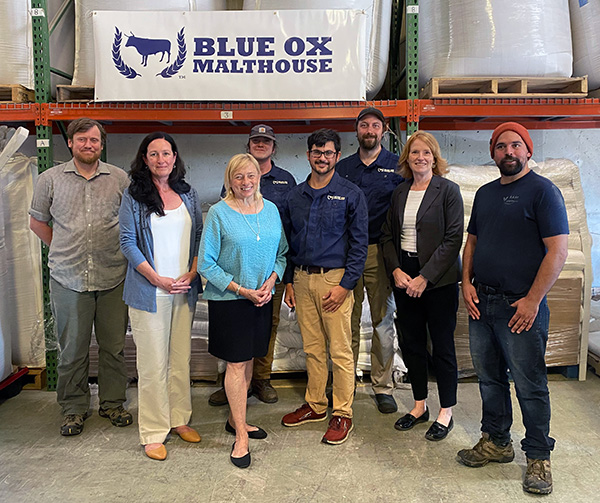
The Agricultural Infrastructure Investment Program delivers vital grant funding to enhance agriculture and food processing infrastructure in Maine
Lisbon Falls, MAINE – Governor Janet Mills today announced nearly $20 million in grant awards through her Maine Jobs & Recovery Plan to help Maine farmers and food processers address infrastructure needs to expand in-state production and processing. These funds will help our farmers increase the supply of Maine-grown food, meet growing demand, create and sustain jobs in one of Maine’s iconic heritage industries while also strengthening our food system, supporting economic growth, and enhancing Maine’s national reputation for food excellence.

Gov. Mills, DACF Commissioner Amanda Beal, and CEI Senior Vice President of Food System Strategies Gray Harris with Joel Alex, Founder of Blue Ox Malthouse, and his employees
The grants were awarded through the Agricultural Infrastructure Investment Program (AIIP) administered through the Department of Agriculture, Conservation and Forestry (DACF). The grants will be used to support a variety of infrastructure needs, including harvesting, processing, and manufacturing or packaging and handling equipment. Improving agricultural infrastructure will allow this sector to increase production and storage capacity, enhance supply chain resilience, and drive growth within the state’s agricultural and food economy while enhancing production of Maine-grown foods.
Funding awards were approved for 64 farms and food processors. The awards ranged from $41,669 to $500,000, with an average of $301,217, and awards were distributed across all sixteen Maine counties. The 64 awards reflect the spectrum of Maine farms and food businesses of various scales and sizes, production methods, and product categories, including dairy, grain, vegetable, fruit, meat, and poultry.
The Governor announced the grants at Blue Ox Malthouse in Lisbon. Blue Ox, a grain processor and recipient of a $500,000 award, purchases grain from farmers across Maine, processes it into malt, then sells that malt to breweries, distillers, and other businesses across Maine. Through its work, Blue Ox serves as a critical link in the agricultural supply chain, supporting local farmers and brewers while strengthening the economy. Blue Ox said it would use its grant to expand processing capacity.
“Our farmers and food processors have told us they can deliver Maine-grown food to more people if they can make upgrades and meaningful and strategic investments in their businesses,” said Governor Janet Mills. “With these grants through my Maine Jobs and Recovery Plan, we can deliver that help and they can deliver to all of us and the world over healthy food, all while creating jobs and strengthening our economy.”
“This nearly $20 million investment in Maine’s agriculture and food sectors will empower business owners to implement innovative solutions that support their continued ability to produce the food we rely on, and address processing bottlenecks while also enhancing value-added production activities and its economic impact on our state,” said Amanda Beal, Commissioner of the Maine Department of Agriculture, Conservation and Forestry. “The Mills Administration is committed to supporting funding opportunities to support our farmers and food processors in the great work that they do.”
“Maine’s 10-Year Economic Development Strategy identified the growing demand for food-sources as an area of economic opportunity for Maine,” said Heather Johnson, Commissioner of the Department of Economic & Community Development. “These investments will help Maine’s farmers and food processors make the critical upgrades they need to feed more people, and in turn, support the creation of job opportunities and overall growth in our economy.”
The investment comes after farmers and food producers who were surveyed by DACF during the pandemic indicated that storage, processing, and packaging capacity investments were critically important to the strength of the agricultural community and the statewide economy.
AIIP was a highly competitive program, ultimately attracting approximately 850 applications, with requests totaling nearly $180 million. DACF recognizes that there is both need and opportunity for additional meaningful and strategic investments to further strengthen Maine’s food system and will continue to work to identify sources of funding to help agriculture and food-based business meet their goals.
Maine is home to approximately 7,600 farms of all sizes, scales, and agricultural practices. Before the pandemic, the aging infrastructure or lack of infrastructure hindered the ability of some of Maine’s farmers and food processors to meet a growing demand for local food and to serve markets outside Maine.
During the pandemic, many restaurants, schools, and other institutions with food service programs temporarily or permanently closed, causing our farmers and food processors suddenly lost some of their biggest wholesale buyers.
“On behalf of the wild blueberry industry in Maine, I thank Governor Mills and am incredibly excited to see these funds put to use to help level up Maine wild blueberry producers’ farm and food production infrastructure,” said Eric Venturini, Director of the Maine Wild Blueberry Commission. “These funds will help make farming profitable and help to grow the positive impact that Maine agriculture has on our State and local economies.”
“Maine dairy producers are a critical industry and economic engine for the state of Maine. Investments for dairy farmers are especially costly, yet critically needed for many of the dairy-related businesses in our state,” said Tade Sullivan, Executive Director of the Maine Dairy Industry Association. “The influx of AIIP funds to improve processing and infrastructure needs statewide are a long-awaited investment.”
“We share in the excitement that the AIIP grant specifically funds infrastructure and processing investments which will increase production, further industry collaboration, and aid those at a pivotal point in expansion,” said Christine Cummings, Executive Director of the Maine Grocers & Food Producers Association. “This program provides critical assistance for our unique, Maine-brand food and beverage manufacturers and ensures continued growth and ultimately, long-term sustainability.”
“In our work with growers and producers across the state, we constantly hear they need processing infrastructure to sustain and grow their small businesses and ensure Mainers have reliable access to healthy local food,” said Hannah Carter, Dean of University of Maine Cooperative Extension. “The AIIP will make significant and immediate impacts on increasing the capacity of our local farms and agribusinesses to process and distribute high-quality products and strengthen Maine’s agricultural economy.”
“CEI believes this investment of ARPA funds has the potential to transform the Maine agriculture sector and food system towards resilience and viability for farmers and producers along the supply chain,” said Gray Harris, Senior Vice President, Food System Strategies, Coastal Enterprises, Inc. “As we read through the hundreds of applications from Maine’s farm and food businesses across the state, we were inspired by their bold visions, creativity, and their commitment, even in these uncertain times, to taking risks and investing in their businesses. CEI was honored to contribute its business and program expertise to Maine DACF and we look forward to seeing these projects implemented.”
“In my work at Maine Farmland Trust I have seen first hand how Maine farmers need improved processing infrastructure to increase our supply of Maine-grown products and to reach new market opportunities for our farms,” said Amy Fisher, President and CEO of Maine Farmland Trust. “It was a privilege to review AIIP applications and gain new insight into the ideas that our innovative and resilient farm-processors are pursuing to supply us with healthy locally processed food. This type of investment will play a critical role in ensuring food security for Maine.”
“The future of Maine agriculture is dependent upon significant investment in infrastructure. Without substantial increases in processing facilities and capacity, the number of farms in Maine will continue to decline, and more food will be imported from out-of-state and internationally,” said Julie Ann Smith, Executive Director, Maine Farm Bureau Association. “We must protect our ability to commercially grow food in Maine by improving our ability to connect farms to consumers, and the AIIP grants are a fantastic first step in helping Maine farms thrive.”
“This type of processing infrastructure is important for Maine to continue to expand on its capacity to offer more Maine food to the institutional market such as ours. Annually, we look at ways to increase our spend on Maine food and increasingly we see opportunities where processing infrastructure is needed to bring products into our campus dining halls. We’re excited to see these opportunities develop,” said Maeve McInnis, Maine Course Director for Sodexo.
“The investments from the AIIP will help address the massive need to expand food processing in Maine so that we increase the availability and accessibility of local food within our communities,”said Jonah Fertig-Burd, community partner for food systems with the Elmina B. Sewall Foundation.
“It’s amazing to see so many high quality and critical infrastructure projects for our food system being funded, and also to better understand the real demand from farmers and processors to increase value added food production in our state. From critical infrastructure growth in organic dairy and grain processing to emerging markets for new products, these projects will create more jobs and help sustain our rural economies,” said Sarah Alexander, Executive Director of Maine Organic Farmers and Gardeners Association.
This Agricultural Infrastructure Investment Program builds on the Mills Administration’s commitment to Maine’s agricultural community. Last year, the Administration awarded $18 million in CARES Act relief grants to more than 600 farms, food processors, food producers, and food banks and pantries across Maine.
The program is also one of three initiatives of the Governor’s Jobs Plan to support the economic recovery of Maine’s heritage industries –forestry, fishing and farming – from impacts due to the COVID-19 pandemic. This year, the Governor’s Jobs Plan has awarded approximately $41 million in economic recovery funds to 392 businesses in these heritage sectors across all 16 counties in Maine.
Since the onset of the pandemic, the Mills Administration has allocated more than $288 million in assistance to support Maine small businesses. In July, the governor announced two further programs — “Grow Maine” and “Thrive Maine” — utilizing federal funds to deliver an additional $120 million to help small businesses succeed in Maine.
The Maine Jobs & Recovery Plan is the Governor’s plan, approved by the Legislature, to invest nearly $1 billion in Federal American Rescue Plan funds to improve the lives of Maine people and families, help businesses, create good-paying jobs, and build an economy poised for future prosperity.
It draws heavily on recommendations from the Governor’s Economic Recovery Committee and the State’s 10-Year Economic Development Strategy, transforming them into real action to improve the lives of Maine people and strengthen the economy.
For more about Maine Jobs & Recovery Plan, visit maine.gov/jobsplan.